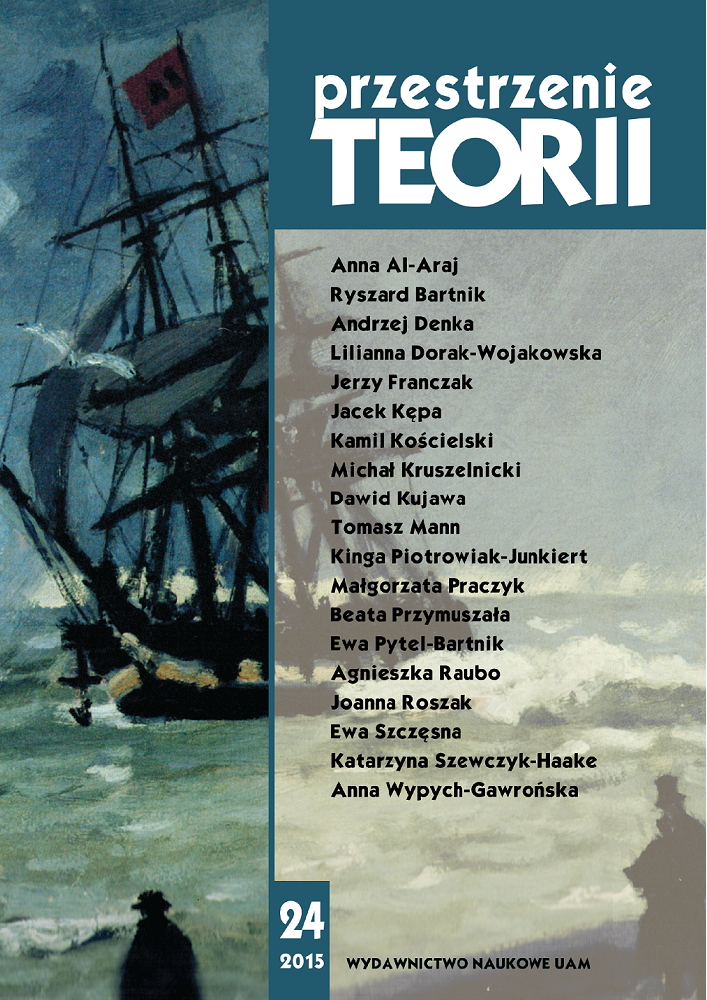Abstrakt
The 1990s saw significant political changes in countries like South African or Northern Ireland. Prior to the revolutionary transformation, the structure of those societies was marked by a rigid bipolar configuration. However, after the political watersheds, what could be observed in the public domain was a turn towards reconciliation. Regardless of its traumatic character, the past was to yield to ‘prospect for the future’. It quickly transpired, however, that the key to deconstruct- ing the walls dividing the societies lay nowhere else but in the past. And it was the local literary field where a discussion on the weight of remembering what has seemingly come to an end was initiated. This paper tries to illustrate that debate by a comparative analysis of two novels represen- tative of the respective cultural contexts: Playing in the Light (2006) by Z. Wicomb and Where They Were Missed (2006) by L. Caldwell.Bibliografia
Adorno T., Aesthetics and Politics, London, New York 2007.
Bartnik R., Factual/Fictional eye-witnessing of the political transition in South Africa – Mike Nicol’s The waiting country: A South African witness, „Werkwinkel” 2012, Vol. 7, nr 1, s. 120–124.
Bartnik R., Frozen thoughts on (Post-)apartheid transgressions as conducive to pro- ducing new ‘unsolicited’ sprouts of contriteness. Tony Eprile in line with John Maxwell Coetzee on the importance of memory in democratic South Africa, [w:] Travelling Texts: J.M. Coetzee and Other Writers, red. B. Kucała, R. Kusek, Frankfurt am Main 2014, s. 283–294.
Bartnik R., [Im]possibility of escape – traumatic residues of the past in the post-Troubles Northern Irish novel, [w:] Studies in Literature in English, red. L. Sikorska, Frankfurt Am Main 2009.
Bartnik R., ‘No bones’ on the road to recovery: Anna Burns’ socio-psychological study of the Northern Irish Predicament, [w:] Ireland and Victims. Confronting the Past, Forging the Future, red. L. Lelourec i G. O’Keeffe-Vigneron. Frankfurt am Main 2010.
Bartnik R., [Un]successful ‘metabolization’ of the Northern Irish war: The post- Troubles trauma in Glenn Patterson’s writing, „Studia Anglica Posnaniensia” 2009, Vol. 45, s. 145–155.
Bauman Z., Ponowoczesność jako źródło cierpień, Warszawa 2000.
Black A., Interview with Lucy Caldwell, 2002, http://www.huffingtonpost.co.uk/alan-black/lucy-caldwell-dylan-thomas-2011_b_1136798.html, dostęp: 01.08.2014.
Caldwell L., Where They Were Missed, London 2006.
Daly E., Sarkin J., Reconciliation in Divided Societies. Finding Common Ground, Philadelphia 2007.
Ericson M., Reconciliation and the Search for a Shared Moral Landscape, Frankfurt am Main, Berlin, Bern, New York, Oxford, Wien 2001.
Erll A., Nűnning A., Where literature and memory meet: Towards a systematic approach to the concepts of memory used in literary studies, „REAL” 2005, nr 21.
Farren S., Mulvihill R., Paths to a Settlement in Northern Ireland, London 2000.
Golka M., Społeczna niepamięć: pomiędzy zapominaniem a zamazywaniem, [w:] Pamięć, przestrzeń, tożsamość, red. S. Kapralski, Warszawa 2010.
Goodall A., Playing in the Light, „Culture Wars” 17.06.2006, http://www.culturewars.org.uk/2006-01/wicomb.htm, dostęp: 29.07.2014.
Gready P., Novel truths: Literature and truth commissions, “Comparative Literature Studies” 2009, vol. 46, nr 1, s. 159.
Humphrey M., The Politics of Atrocity and Reconciliation, London 2002.
Jacobs S., Reading politics, reading media, [w:] Shifting Selves. Post-Apartheid Essays on Mass Media, Culture and Identity, red. H. Wasserman, S. Jacobs, Cape Town 2003.
Kapralski S., Pamięć, przestrzeń, tożsamość. Próba refleksji teoretycznej, [w:] Pamięć, przestrzeń, tożsamość, red. S. Kapralski, Warszawa 2010.
Kennedy-Andrews E., (de-)constructing the North, Dublin 2003.
Kofta P., Wywiad Piotra Kofty z Arielem Dorfmanem, „Dziennik – Kultura” 02.02. 2007, s. 88.
Koselleck R., Future Past: The Semantics of Historical Time, New York 2004.
Koselleck R., Semantyka historyczna, wybór i oprac. H. Orłowski, przeł. W. Kunicki, Poznań 2001.
Kwiatkowski P., Czy lata III Rzeczypospolitej były „czasem pamięci”?, [w:] Pamięć zbiorowa jako czynnik integracji i źródło konfliktów, red. A. Szociński, Warszawa 2009.
Meyer S., Olver T., Zoë Wicomb interviewed on writing and nation, 2002, http://www.thefreelibrary.com/Zoe+Wicomb+interviewed+on+writing+and+nation.-a0110229013, dostęp: 02.08.2014.
Mitosek Z., Poznanie (w) powieści, Kraków 2003.
Nicol M., The Waiting Country, London 1995.
Nycz R., Literatura nowoczesna wobec doświadczenia, „Teksty Drugie” 2006, nr 102.
Patterson G., Lapsed Protestant, Dublin 2006.
Ricoeur P., Pamięć, historia, zapomnienie, Kraków 2006.
Sacks J., Turning enemies into friends, [w:] After Terror, red. A. Ahmed, B. Frost, Cambridge 2005.
Schulze K., Taking the gun out of politics: conflict transformation in Northern Ireland and Lebanon, [w:] Northern Ireland and the Divided World. Post-Agreement Northern Ireland in Comparative Perspective, red. J. McGarry, Oxford 2004
Smyth G., Remembering to Begin with Peace, Dublin 2007.
Steyn M., Taxi to Soweto and Panic Mechanic: two cinematic representations of whiteness in South Africa post-1994, [w:] Shifting Selves. Post-apartheid Essays on Mass Media, Culture and Identity, red. H. Wasserman, S. Jacobs, Cape Town 2003
Wicomb Z., Playing in the Light, New York, London 2006.
Zaleski M., Formy pamięci, Gdańsk 2004.
Licencja
Autorzy
Autorzy tekstów przyjętych do publikacji w czasopiśmie „Przestrzeniach Teorii” są zobowiązani do wypełnienia, podpisania i odesłania na adres redakcji umowy o udzielenie nieodpłatnej licencji do utworów, z zobowiązaniem do udzielania sublicencji CC.
Zgodnie z umową, autorzy tekstów opublikowanych w czasopiśmie „Przestrzeniach Teorii” udzielają Uniwersytetowi im. Adama Mickiewicza w Poznaniu niewyłącznej i nieodpłatnej licencji oraz zezwalą na użycie sublicencji Creative Commons Attribution-NonCommercial-NoDerivatives 4.0 International (CC BY-NC-ND 4.0).
Autorzy zachowują prawa do dalszego, swobodnego rozporządzania utworem.
Autorzy, którzy wykorzystują w swoim tekście cudze utwory (np. ilustracje, fotografie) proszeni są o dostarczenie do redakcji czasopisma zgodę na publikację od uprawnionych podmiotów.
Użytkownicy
Zainteresowani użytkownicy internetu uprawnieni są do korzystania z utworów opublikowanych po 2015 roku „Przestrzeniach Teorii” tylko w calach niekomercyjnych, pod następującymi warunkami:
- uznanie autorstwa - obowiązek podania wraz z rozpowszechnionym utworem, informacji, o autorstwie, tytule, źródle (odnośniki do oryginalnego utworu, DOI) oraz samej licencji;
- bez tworzenia utworów zależnych - utwór musi być zachowany w oryginalnej postaci, nie można bez zgody twórcy rozpowszechniać np. tłumaczeń, opracowań.
Do wszystkich tekstów opublikowanych przed 2015 r. prawa autorskie są zastrzeżone.
Inne
Uniwersytet im. Adama Mickiewicza w Poznaniu zachowuje prawo do czasopisma jako całości (układ, forma graficzna, tytuł, projekt okładki, logo itp.).
